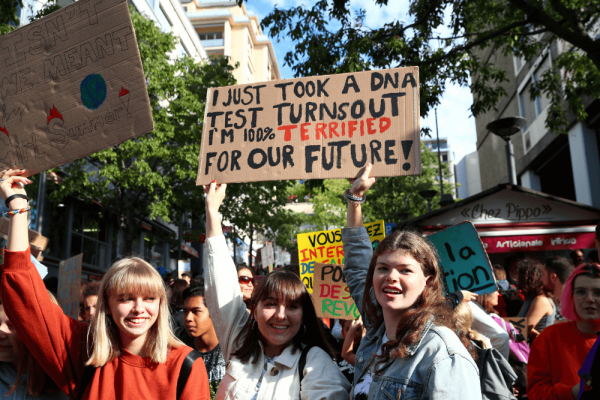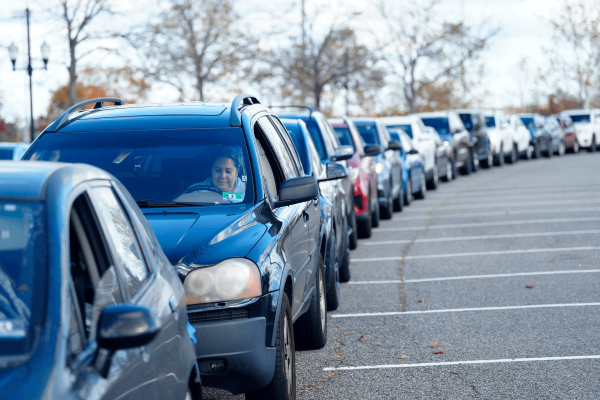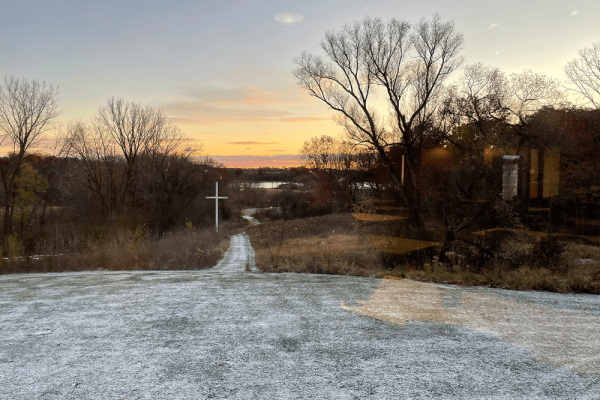In the year 2050, when today’s 3-year-olds will be 30-year-olds, climate scientists expect the height of the slowly unfolding climate disaster to have arrived. The specifics vary slightly, but most experts warn that some regions will face extreme drought while others are entirely flooded with sea level rise. Dangerous heat and humidity — as some regions of the U.S. have faced this summer — combined with poor air quality will make it dangerous to be outside for a growing portion of the year in many places.
That bleak future was at the heart of a history-making win for young climate activists, as a Montana judge ruled earlier this month that the state has violated the 16 youth plaintiffs’ constitutional rights. The judge found that by allowing the fossil fuel industry to operate without concern for the effect of greenhouse gas emissions, the state was violating the youth’s right to a clean and healthful environment, which in turn denied them their rights to equal protection, dignity, liberty, health and safety, and public trust.
“Plaintiffs’ injuries will grow increasingly severe and irreversible without science-based actions to address climate change,” Judge Kathy Seeley wrote in her 103 page decision. “Plaintiffs have proven that as children and youth, they are disproportionately harmed by fossil fuel pollution and climate impacts.”
The ruling finds that the state’s failure to consider the impact on the climate when approving new fossil fuel projects is unconstitutional, striking down several state laws that prohibited such consideration. Though the implementation of the ruling will be up to Montana’s conservative-leaning statehouse and the state attorney general’s office has stated they will appeal the ruling, young climate activists say it’s an important moment of recognition.
“Today we witnessed democracy in action as Montana’s judiciary fulfilled its constitutional duty to hold the political branches accountable for actions exacerbating the climate crisis and causing harm to the state’s youngest and most vulnerable people,” said Nate Bellinger, senior staff attorney with Our Children’s Trust, in a news release after the ruling. “This is what climate justice in the courts, and protecting the constitutional rights of our childrens’ right to a safe climate looks like.” Our Children’s Trust represented the young plaintiffs in the case.
The importance of climate action for millennials, Gen Z, and even Generation Alpha is logical, said Tori Goebel, a national organizer and spokesperson for Young Evangelicals For Climate Action. “For young people it’s about protecting our community and our very real future.”
Globally, the very young (ages 0-5) are already among those most impacted by a changing climate, said Amy Wickham, program specialist on climate, energy and environment for UNICEF. “Very young children from all corners of the earth are already on the move, driven from their homes.”
Weather-related disasters, drought, famine, and increases in climate related diseases like malaria and dengue fever affect the very young for four reasons, Wickham said. They are mentally and emotionally more vulnerable to the disruption of routine and displacement, they are physically more vulnerable to air quality issues and heat stress, they are more likely to die from diseases like malaria and to malnutrition, and lastly, they are the ones who will have to live with these conditions the longest.
It’s difficult to estimate the number of children currently affected by climate-related disasters, but UNICEF and Fridays for Future’s 2021 comprehensive analysis found that 1 billion children — about half the world’s child population — lived in countries with a high risk of climate-related danger or displacement.
The global impact of climate change already felt is part of what drew Goebel to the issue, she said. Like many young evangelicals, she grew up in a church committed to missions and charitable ministries around the world. “I was confused why a church that was focused on loving people was ignoring this issue,” Goebel said, but many younger Christians see the two as inseparable. “We can love God by loving what God loves.”
Many young evangelicals grew up with parents and church elders who presented science as an enemy of faith, perhaps because that is how their spiritual leaders talked about it, she said. Not just because science was trying to explain what had always been attributed to God — everything from cosmic phenomena to group worship dynamics — but also because science is so often politicized, and evangelicals were becoming more and more closely aligned with the Republican party.
Instead of taking the culture war attitude toward science, Goebel said, the evangelical teens and young adults in YECA present environmental action to their churches and communities as something hopeful, a constructive space for generations to unite around something that can be built up, not torn down.
“We can improve public health, we can build the economy […] there’s a lot of potential in climate action if we focused on the benefit instead of the blame,” she said. Her hope is that young Christians are the right people to get older Christians on board, because they are demonstrating what it looks like for a new generation to embrace Christianity. Environmental protection isn’t replacing their faith in Jesus, it’s how they live out that faith. Often engagement with churches starts with a call to young YECA in prayer for the environment and those acting to protect it.
The group has seen progress on Christian college campuses, places many thought would be resistant. One YECA member started a club at University of Northwestern St. Paul, a Christian campus in Minnesota, right before COVID-19 hit; even with that setback, the club now has 435 members and has started a campus-wide composting program, Goebel said. College programs like these show what can be done without huge budgets or institutional control.
Young Evangelicals for Climate Action focuses mainly on ages 18-31, but more and more younger people are getting involved as well, Goebel said. College groups have inspired high schoolers and middle schoolers to start similar clubs and initiatives. The younger the kids, the more urgent climate action is: They will have longer to live with the effects of climate change. Often, however, those young kids feel limited by the lack of control they have over the systems in their lives. A global survey of 16-25 year olds published in the Lancet found that 84 percent were between moderately and extremely worried about the future of the planet. Respondents described their emotions as “sad, anxious, angry, powerless, helpless, and guilty.” Three-quarters found the future frightening.
But adults are not off the hook at all, Wickham said.
UNICEF works with parents and government institutions to try to keep climate events from fully disrupting children’s access to nutrition, education, and healthcare. Helping kids understand how ecology and biodiversity work both helps raise a generation with a more ecologically savvy view of industry, economy and infrastructure, said Wickham, and teaching them how to advocate for themselves helps them feel less helpless. “They feel empowered and equipped with the knowledge of what’s going on around them.”
But she also pointed to recent testimony from young activists about how frustrating and defeating it is to run up against the roadblocks of underfunding, policy entrenchment, and the resulting burnout.
But the youngest children, those ages 0-5, are a stark reminder of the responsibility of adults, Wickham said. They cannot organize or vote. They cannot start recycling programs or run energy audits. They need the adults in their lives to listen to climate science and act with them in mind. “We have the major role as adults in society to protect children and see that they have a livable environment,” she said. As encouraging as the Montana win might be, she said the thought that children would need to sue their government in order to ensure their right to health should give us all pause. “We have a lot to answer to and for (when it comes to) our children.”
Got something to say about what you're reading? We value your feedback!






